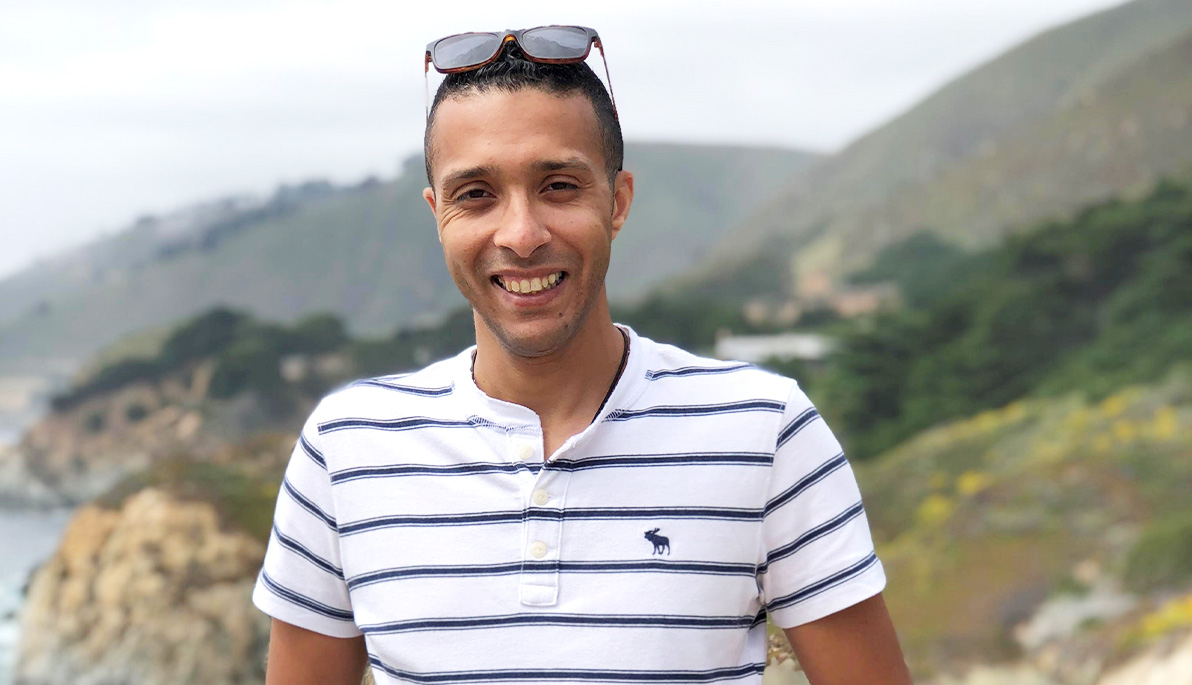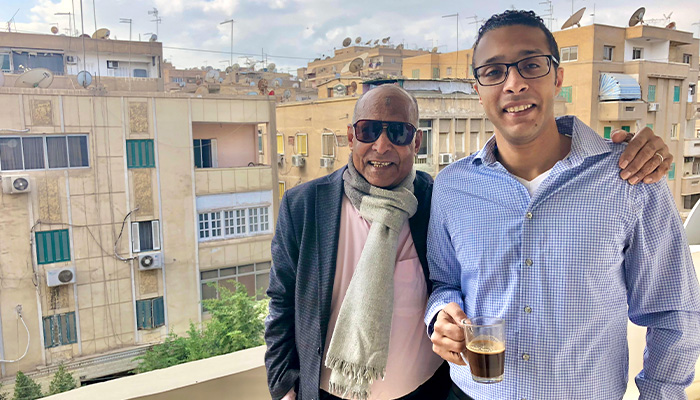
Student Profile: Mahmoud Elhagagy

Major: D.O., Osteopathic Medicine
Year Expected to Graduate: 2022
Campus: Long Island
Hometown: Luxor, Egypt
Putting the Health in Healthcare
When Mahmoud Elhagagy had the opportunity to move to the United States to practice medicine, he took it.
Now, he’s preparing to graduate from the College of Osteopathic Medicine’s (NYITCOM) Émigré Physicians Program, a unique program that invites foreign physicians to become doctors of osteopathic medicine (D.O.) in the United States.
In 2013, Elhagagy moved to the United States to pursue a career in medicine and clinical research. But back in Egypt, he had already graduated from medical school and was a resident physician at Assuit University Urology Hospital. In 2011, Elhagagy even served on the Egyptian Medical Syndicate’s first response team during the Egyptian Revolution and assisted injured people in Cairo’s Tahrir Square, commonly referred to as “Martyr Square.”
Naturally, when he relocated to America, Elhagagy brought his passion for helping others.
“Some of my patients were sad to see me go as well, which was humbling. At the time, Egypt was recovering from a revolution. Conditions are strenuous for physicians there, so being a part of the United States’ world-class healthcare system was a goal I wished to pursue,” says Elhagagy.
While his path to becoming an American urologist was not direct, it would be incredibly rewarding.
“I conducted research in Cincinnati while delivering pizza to make ends meet, I managed cardiology clinical trials in Brooklyn, and, at one point, I drove for Uber,” he says.
Despite these challenges, Elhagagy persevered. Prior to attending NYITCOM, he also researched breakthroughs in urological oncology and other critical areas. This included employment with the clinical trials department at New York-Presbyterian Brooklyn Methodist Hospital, as well as Geisinger Health System in Pennsylvania and the University of Cincinnati College of Medicine, where he’ll now return to complete his urology residency after graduation.
In 2018, he enrolled in NYITCOM’s Émigré Physicians Program and quickly became involved in the medical school’s community service efforts. He helped to provide care to uninsured patients at the Community Free Clinic and assisted the Asylum Clinic, serving as a member of the clinic’s founding group and country research leadership team, which studies and creates reports on asylum seeker countries.

Mahmoud Elhagagy plans to follow in his father’s footsteps and pursue a career in urology.
“[I thought], if I had to undertake medical school for a second time to accomplish my dream of becoming an American urologist, then so be it! Past clinical experiences have benefited me, and being a medical student in the United States has been very rewarding. I embraced all aspects of school at NYITCOM, and I approached each third-year clerkship with enthusiasm and willingness,” he says.
When Elhagagy is asked what most excites him about starting his residency, he notes that he’s ready to experience cutting-edge technologies in robotic surgery, minimally invasive surgery, and urologic oncology. But experiencing medical innovation and specialized training isn’t all that’s on his mind—Elhagagy is laser-focused on the human impact of his work.
“I’m also looking forward to global health opportunities and making long-lasting connections with other physicians in and outside the field of urological surgery,” he says.
Naturally, this focus on the human connection is key to being a good physician, and Elhagagy will bring his well-rounded training, community service, and research experience to his residency at the University of Cincinnati. But his drive to help others doesn’t end with medicine—or even humans for that matter. On his resumé, listed alongside impressive renal cancer research, he’s also sure to note his volunteer experience at the Mount Pleasant Animal Shelter in New Jersey, where he assisted with animal adoption programs, dog walking, and animal socialization.
You might say that caring is in Elhagagy’s DNA, as his desire to pursue medicine was inspired by his father, who was a respected urologist in the family’s home country of Egypt. When Elhagagy learned of his urology residency match, the timing was especially poignant, as his father had recently passed away from COVID-19. Now, he plans to follow in his father’s footsteps.
“My father was an intellectual and a fervent urologist. He continued seeing patients in his 70s, he traveled the world attending conferences, and his last bedside book was Hinman’s Atlas of Urologic Surgery, with highlighting throughout, which I brought back with me [to the United States]. I grew up in a household immersed in medicine, and I observed him at his clinics and in the operating room. My father’s faith guided him—he cared for patients equally and was charitable. I hope to carry on my father’s legacy by treating underrepresented populations and occasionally aiding my community back home through my father’s clinics.”









